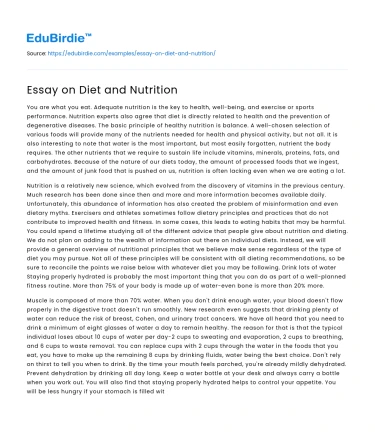Introduction
Diet and nutrition play pivotal roles in maintaining health and preventing chronic diseases. The modern lifestyle, characterized by fast-paced routines and processed food consumption, often leads to suboptimal dietary habits. Understanding the complexities of nutritional science is essential for promoting well-being and longevity. Proper nutrition is not merely about calorie intake but involves balancing macronutrients—proteins, fats, and carbohydrates—and micronutrients, such as vitamins and minerals. This essay explores the intricate relationship between diet and nutrition, examining how they affect human health, and argues for the adoption of balanced dietary practices. Despite the availability of ample information on the significance of diet, misconceptions persist, necessitating a deeper exploration of evidence-based dietary practices.
Understanding Macronutrients and Their Impact
Macronutrients—proteins, carbohydrates, and fats—constitute the bulk of our diet and serve as the primary sources of energy. Proteins are crucial for building and repairing tissues, as well as for enzyme and hormone production. According to the Dietary Guidelines for Americans, proteins should account for 10-35% of daily caloric intake. Despite this recommendation, many individuals do not consume adequate amounts of protein, partly due to dietary preferences or misconceptions about protein sources. Plant-based proteins, such as legumes and nuts, are often overlooked, though they provide essential amino acids needed for optimal health.
Save your time!
We can take care of your essay
- Proper editing and formatting
- Free revision, title page, and bibliography
- Flexible prices and money-back guarantee
Carbohydrates, another essential macronutrient, are the body's main energy source. The quality of carbohydrates consumed is crucial; whole grains, fruits, and vegetables offer dietary fiber and essential nutrients, whereas refined sugars can increase the risk of obesity and type 2 diabetes. The American Heart Association advises limiting added sugars to less than 10% of total daily calories to mitigate these risks. Conversely, fats, particularly unsaturated fats found in fish, nuts, and olive oil, are important for maintaining healthy cell function and reducing inflammation. However, trans fats and excessive saturated fats, common in processed foods, contribute to cardiovascular diseases.
Transitioning to a balanced diet that includes appropriate proportions of macronutrients can significantly improve health outcomes. For example, the Mediterranean diet, rich in healthy fats and low in red meat, has been associated with reduced risks of heart disease and stroke. This demonstrates the importance of choosing the right types of macronutrients rather than merely focusing on their quantity.
The Role of Micronutrients in Preventing Deficiencies
Micronutrients, although required in smaller quantities, are equally vital for maintaining health. They include vitamins, such as vitamin C and D, and minerals, like calcium and iron. Micronutrient deficiencies can lead to a range of health issues, including anemia, osteoporosis, and impaired immune function. For instance, vitamin D deficiency is prevalent, especially in regions with limited sunlight, and is linked to bone density loss and increased risk of fractures. The National Institutes of Health recommends vitamin D supplementation for individuals at risk of deficiency.
Iron, another critical micronutrient, is essential for oxygen transport in the blood. Iron deficiency anemia affects millions globally, particularly women and children. Incorporating iron-rich foods, such as red meat and leafy greens, along with vitamin C to enhance absorption, can help prevent this condition. Calcium, crucial for bone health, is another nutrient often lacking in diets, particularly among the elderly. Dairy products and fortified plant-based alternatives are excellent sources of calcium, supporting bone density and reducing osteoporosis risk.
Counterarguments suggest that supplementation can compensate for dietary deficiencies. However, over-reliance on supplements can lead to imbalances and potential toxicity. It is generally preferable to obtain micronutrients through a varied and balanced diet, as whole foods provide additional benefits, including dietary fiber and phytochemicals, which supplements cannot replicate.
Adopting a Holistic Approach to Nutrition
A holistic approach to nutrition considers not only the dietary intake but also lifestyle factors that influence health. Stress, physical activity, and sleep patterns significantly affect nutritional status and overall well-being. The World Health Organization emphasizes the importance of lifestyle modifications alongside dietary changes to combat non-communicable diseases. Regular physical activity, combined with a balanced diet, enhances metabolic health and reduces the risk of obesity.
Furthermore, cultural and socioeconomic factors play a role in dietary choices. Food accessibility and affordability can limit the availability of nutritious options, contributing to dietary imbalances. Efforts to improve public health must address these factors by promoting nutrition education and ensuring access to healthy foods for all populations. As Michael Pollan aptly states, "Eat food, not too much, mostly plants," underscoring the simplicity and effectiveness of returning to whole, minimally processed foods for optimal health.
Transitioning to a holistic dietary approach requires collaboration between policymakers, healthcare providers, and individuals. Education and awareness campaigns can empower individuals to make informed dietary choices, while policy changes can create environments conducive to healthy eating habits.
Conclusion
In conclusion, diet and nutrition are fundamental to health and well-being, influencing both physical and mental health outcomes. A balanced intake of macronutrients and micronutrients, coupled with a holistic approach that considers lifestyle and environmental factors, can lead to significant improvements in public health. While challenges such as misinformation and accessibility persist, a concerted effort to educate and empower individuals can foster healthier communities. As scientific understanding of nutrition evolves, ongoing research and evidence-based guidelines will continue to shape dietary recommendations, ultimately promoting a healthier society.






 Stuck on your essay?
Stuck on your essay?

